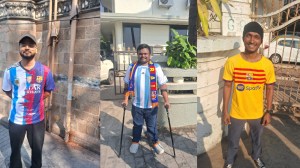1 in 5 adolescents in Delhi are clinically sleep-deprived. Here’s what a study shows
It said late-night screen time and binge-watching have led to disturbed sleep cycles among adolescents, misaligned natural rhythms, cognitive strain, and the prevalence of depressive symptoms.
 60% of the participants exhibited depressive symptoms, and poorer sleep hygiene was strongly associated with greater sleep deprivation. (Representative image)
60% of the participants exhibited depressive symptoms, and poorer sleep hygiene was strongly associated with greater sleep deprivation. (Representative image)When a 12-year-old student living in Patel Nagar and his parents recently stepped into the outpatient department at Sir Ganga Ram Hospital, the child appeared quiet, distracted, and low on energy. He had not slept properly for more than a week, said his mother.
She was concerned. In the past year, she said her son’s academic performance had dipped, and he had trouble concentrating. He often stayed up late, had begun to withdraw from friends, and seemed anxious and detached.
On the surface, the boy looked physically fine — but a deeper conversation revealed that his cognitive and emotional health were under strain, said Dr Latika Bhalla, Senior Consultant and Adolescent Paediatrician at the hospital’s Institute of Child Health.
“He had been failing classes in school… and over the past few months, his sleep cycle had become irregular. He admitted to staying up late, constantly thinking about school and studies. Recently, when given holiday homework, he sat in the same spot for over six hours straight — without taking a break or eating — just to get it done quickly. The pressure of falling behind had begun shaping his daily habits and emotional state,” she said.
Dr Bhalla added: Coming from a lower-to-middle-income household, he didn’t have a peaceful space to study or sleep. The noise, lack of privacy, and ongoing academic expectations were making it hard for him to focus or rest properly. His ability to retain information, concentrate on tasks, and stay mentally present had started to suffer. He had even begun avoiding friends and isolating himself, thinking that being alone might help him ‘catch up’.”
According to Dr Bhalla, this case clearly reflects how sleep deprivation and academic stress don’t just affect school grades — they impact focus, memory, mood, eating habits, and social interactions. “It’s not just about being tired; it’s about how sleep and cognitive strain start to quietly reshape a child’s emotional and intellectual life,” she said.
Recently, Dr Bhalla conducted a study on 1,529 children in the 12-18 year age group from across Delhi schools to ascertain the prevalence of sleep deprivation and its association with cognitive functioning in school-going adolescents.
The study found that 1 in 5 adolescents are clinically sleep-deprived in Delhi. It said late-night screen time and binge-watching have led to disturbed sleep cycles among adolescents, misaligned natural rhythms, cognitive strain, and the prevalence of depressive symptoms.
According to Dr Bhalla, this is linked to their academic underperformance and mental health as well.
The study was conducted in collaboration with the National Health Systems Resource Centre (NHSRC). The students were analysed after taking consent from their parents and schools.
Dr Bhalla recently shared insights and findings of the study. Some of the key findings include:
- 22.5% of adolescents were found to be sleep-deprived
- Sleep-deprived students had a lower mean academic score (64%) compared to non-sleep-deprived peers (67%)
- 60% of the participants exhibited depressive symptoms, and poorer sleep hygiene was strongly associated with greater sleep deprivation
- 65.7% of participants showed poor cognitive functioning (mostly mild to moderate).
She said it is important to integrate sleep education into the school curriculum, train teachers on adolescent sleep health, and include a two-part sleep diary parent component.
According to Dr Sanjay Manchanda, Chairman, Department of Sleep Medicine, at Sir Ganga Ram Hospital, adolescent sleep issues often serve as precursors to adult sleep disorders. He said policy-level changes in school timings, referencing global studies and the report’s recommendation to adjust school hours to better suit adolescent sleep patterns, are needed.
What doctors at other hospitals say
Similar trends have been witnessed by pediatricians from hospitals across Delhi. Dr Viny Kantroo, Senior Consultant, Respiratory, Critical Care and Sleep Medicine, Indraprastha Apollo Hospitals, said, “… it can still be controlled if we raise awareness”.
He suggested that the cure is simple and requires lifestyle changes — increased exercise; dietary changes such as avoiding heavy fatty meals just before sleep; having proper sleep timings; and better sleep hygiene that includes reducing screen times, meditation and picking up hobbies to relax.
According to Dr Rajesh Sagar, professor of psychiatry at AIIMS Delhi, who has expertise in Child & Adolescent Psychiatry, sleeplessness in adolescents has become a common problem.
In 2015 and 2019, Dr Sagar conducted studies on sleep disturbances in children with attention-deficit hyperactivity disorder and on adolescents with depression having sleep problems and sleep hygiene.
“There are problems related to anxiety… emotional problems, stress… and all this may lead to sleep-related issues… The underlying issue could be something else, but it manifests as a sleep problem, which may be related to any emotional difficulties or stress or anything,” he said.
Dr Sagar said having a good sleep is important in terms of physical and mental well-being.
But is it restricted to Metro cities like Delhi? Dr Sagar said one cannot say if the phenomenon is seen more in Metro cities unless doctors compare the rural and urban populations.
“But yes, I think in metros, you have to rush to your work or college or school. There is stress, the daily hassles, meeting deadlines… the support system in urban setups is not as strong as compared to rural areas, so that may be a contributor. Again, one has to have a proper head-to-head comparison,” he added.







